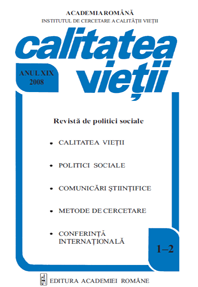Contexte locale de furnizare a bunăstării şi încrederea interpersonală şi instituţională. O analiză în mediul rural românesc
Local contexts of promoting welfare, in relation with interpersonal and institutional trust. An analysis in the rural areas of Roumania
Author(s): Mihnea PreotesiSubject(s): Social Sciences
Published by: Editura Academiei Române
Keywords: welfare; social change; interpersonal trust; institutional trust; rural area.
Summary/Abstract: Romanian rural area had, in 1989, some characteristics that constituted the premises for the development of an unique model of post-communist evolution. The unexpected and sudden penetration in a world where new rules were applied generated actional and axiological confusion. The types of responses to the social change can be synthesized in two large categories: active and passive responding strategies. In the Romanian rural area, the transition generated both types of responding strategies. As regarding the analysis that we suggest here we are interested in the pasive strategy, the “handover” of responsability of solving the situations created by the transition to the state shocks, as main provider and guarant of the welfare, which generates and maintains, according to Almond and Verba, a so-called culture of dependence. Concerning the active strategies, we shall analyse the protest by refusing the rules strategy from the “rebellion” category – as we shall further see is more a way to adapt these rules and partially to obey them. The main hypothesis for this analysis is the selection of one or other of these two types of strategies depending on the degree to which some contexts enable the existence of some opportunities/ informal practices/ illegal earning.
Journal: Calitatea vieţii
- Issue Year: XIX/2008
- Issue No: 1-2
- Page Range: 125-139
- Page Count: 15
- Language: Romanian

